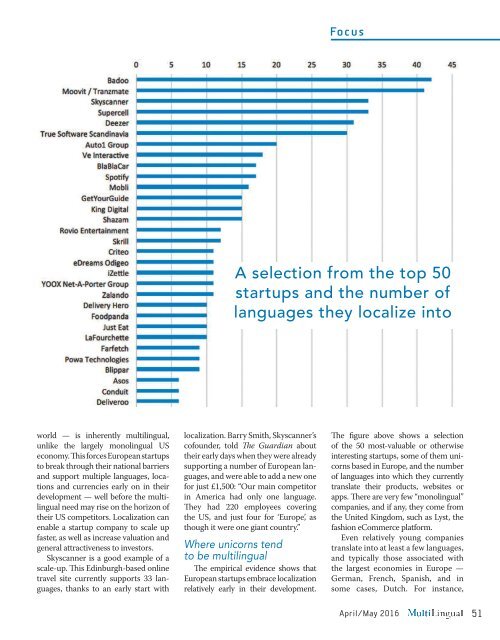Localization
z99kl79
z99kl79
Create successful ePaper yourself
Turn your PDF publications into a flip-book with our unique Google optimized e-Paper software.
Focus<br />
A selection from the top 50<br />
startups and the number of<br />
languages they localize into<br />
world — is inherently multilingual,<br />
unlike the largely monolingual US<br />
economy. This forces European startups<br />
to break through their national barriers<br />
and support multiple languages, locations<br />
and currencies early on in their<br />
development — well before the multilingual<br />
need may rise on the horizon of<br />
their US competitors. <strong>Localization</strong> can<br />
enable a startup company to scale up<br />
faster, as well as increase valuation and<br />
general attractiveness to investors.<br />
Skyscanner is a good example of a<br />
scale-up. This Edinburgh-based online<br />
travel site currently supports 33 languages,<br />
thanks to an early start with<br />
localization. Barry Smith, Skyscanner’s<br />
cofounder, told The Guardian about<br />
their early days when they were already<br />
supporting a number of European languages,<br />
and were able to add a new one<br />
for just £1,500: “Our main competitor<br />
in America had only one language.<br />
They had 220 employees covering<br />
the US, and just four for ‘Europe’, as<br />
though it were one giant country.”<br />
Where unicorns tend<br />
to be multilingual<br />
The empirical evidence shows that<br />
European startups embrace localization<br />
relatively early in their development.<br />
The figure above shows a selection<br />
of the 50 most-valuable or otherwise<br />
interesting startups, some of them unicorns<br />
based in Europe, and the number<br />
of languages into which they currently<br />
translate their products, websites or<br />
apps. There are very few “monolingual”<br />
companies, and if any, they come from<br />
the United Kingdom, such as Lyst, the<br />
fashion eCommerce platform.<br />
Even relatively young companies<br />
translate into at least a few languages,<br />
and typically those associated with<br />
the largest economies in Europe —<br />
German, French, Spanish, and in<br />
some cases, Dutch. For instance,<br />
April/May 2016 51


